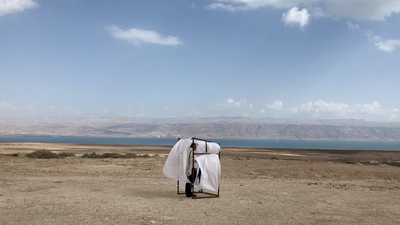Jerusalem

Qumran, the archaeological site in Israel’s West Bank from which the Dead Sea scrolls were excavated, is located on a desert plateau about 1 kilometer to the east of Jerusalem near the northwestern shore of the Dead Sea. The site’s famous caves—where the ancient manuscripts were found in equally ancient vessels—are known as Wadi Qumran. They sit 70 meters above the level of the Dead Sea, which is the lowest point on Earth at 325 meters below sea level. For me, this place is a link in the continuity of faith.
I journeyed with my tent to Qumran and erected it on a flat, sandy patch of the plateau overlooking the Dead Sea on one side and the Qumran excavation site on the other.
Reciting the Shacharit or morning Jewish prayer in the tent on that spot was a magical experience. I am indebted to Zvi Geva, a modern Jew, who agreed to lend his voice for the prayers.
The Dead Sea Scrolls were discovered between 1946 and 1956, first by Bedouin shepherds and then by teams of archaeologists. The practice of storing worn-out sacred manuscripts in earthenware vessels and then burying those vessels in the earth or in caves is related to the ancient Jewish custom of keeping a genizah, or storage space within the synagogue for tattered or spent books. All old religious texts had to be buried, since it is considered sacrilegious in the Jewish faith to discard anything that included God’s name.
Of course, the Dead Sea Scrolls have great historical, religious, and linguistic significance, because they comprise a vast collection of ancient Jewish documents written in Hebrew, Aramaic, and Greek. Encompassing many subjects and literary styles, these texts include manuscripts and fragments of every book in the Hebrew Bible (except the Book of Esther), all of which were created nearly one thousand years earlier than any previously known biblical manuscripts.
A canon of scripture is a set of texts or oral transcriptions that a particular religious community regards as authoritative. The root of the word canon comes from the Greek term for rule, as in ruler or measuring stick. There are closed canons, such as the Bible or other books to which nothing may be added or removed. In contrast, an open canon permits the addition of books through the process of continuous revelation. In many ways, the finding of the Dead Sea Scrolls reaffirmed the closed canon of the Jewish tradition.


